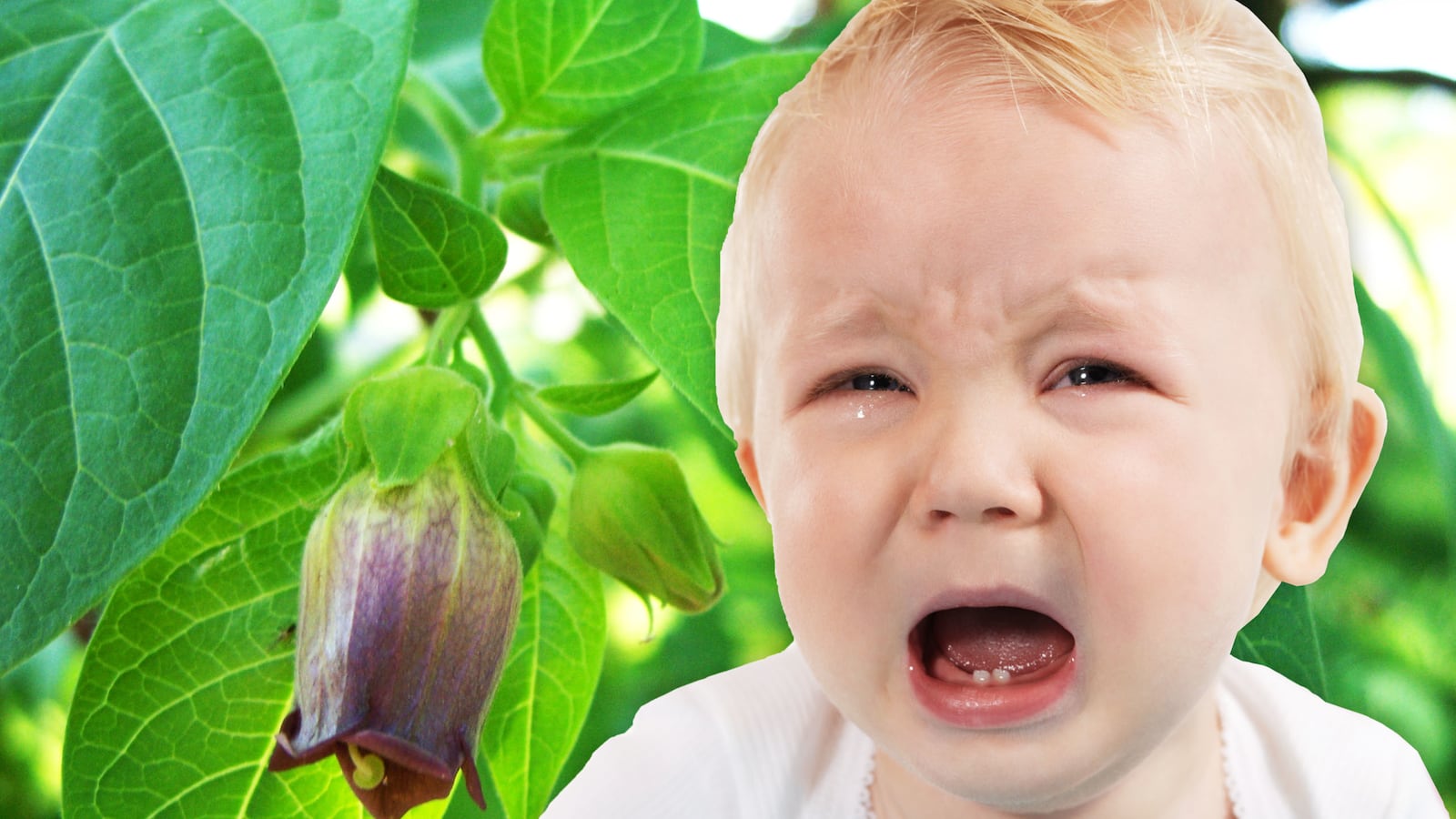The inauguration of Donald Trump as the 45th president of the United States wasn’t the only shakeup to the natural order of things this January. That same month, a drug company rebuffed the FDA over a potentially dangerous product for infants.
The agency had zeroed in on a line of over-the-counter baby teething products containing the toxic herb belladonna—otherwise known as “deadly nightshade.” But when it asked the company to recall its products, the response was a big fat “No.”
There’s something peculiar about this company and its products that explains its cavalier attitude: it lives in an alternate universe called homeopathy. And although homeopathy hasn’t played by the usual rules of science and medicine for over 200 years now, regulators around the world are finally closing in.
The story of Hyland’s Homeopathic versus the FDA should serve as a final warning to consumers and retailers alike that homeopathic products don’t deserve our trust.
The FDA has long pursued the Los Angeles-based Standard Homeopathic Company, which does business as Hyland’s Homeopathic. The agency has been warning consumers about its teething products since 2010. The problem back then was the same issue we’re seeing play out seven years later: substandard manufacturing processes resulting in inconsistent levels of the dangerous ingredient belladonna.
Belladonna is used in a line of products Hyland’s sells to relieve infant teething pain, so babies and their parents can get some rest. Never mind that pediatricians don’t recommend anything other than a cool teething ring for teething pain, an experience that is part of normal human development. The box of Hyland’s Baby Teething Tablets I have sitting on my desk includes a Drug Facts label with the claim, “Please note: If your child has been crying or upset, your child may fall asleep after using this product because the pain has been relieved and your child can rest.” With urgent notices like that, what harried parent wouldn’t be inclined to pick up a bottle?
I have two bottles in my possession because Hyland’s really believes in its teething tablets and gels, and despite recalling the drugs back in 2010, it eventually brought them back to the marketplace. Five years after the FDA warned it was receiving reports of serious reactions in children that looked like belladonna toxicity, a mother of a child who suffered non-epileptic seizures shortly after taking the tablets came forward to her local news station to share her frightening experience.
The belladonna plant, or deadly nightshade, can cause a haywire “fight or flight” response because it contains compounds that put a blockade on the part of the nervous system that calms the body and promotes digestion, ramping up everything else. Medical students have longed memorized the key effects of so-called anticholinergic toxicity with the phrase “Dry as a bone, hot as a hare, red as a beet, blind as a bat, and mad as a hatter.” A tiny infant can become so overwhelmed by the effects that she will start to seize.
Hyland’s proved feisty, fighting back in the media with a statement that suggested the child’s doctors might not have done their jobs too well, unfairly blaming their company’s drug when something else may provoked the child’s seizure. The mother told reporters she felt like the company was trying to “disqualify” her report.
But the FDA was listening, and last fall it again warned consumers to stop using homeopathic teething products altogether, and the agency told reporters it was investigating 10 deaths associated with the products. Stat News used the Freedom of Information Act to obtain adverse event reports submitted by parents and doctors to the FDA over the years, recounting harrowing tales of children who stopped breathing or became unresponsive shortly after taking Hyland’s tablets.
Finally in January the agency released data showing it had found inconsistently high levels of belladonna in teething products produced by Hyland’s Homeopathic, levels that didn’t correlate with the doses on the product’s label—the belladonna compounds should have been so low they’d be undetectable even with the sensitive methods the FDA lab used. Instead, some tablets had undetectable levels, and other ranged from 0.1 to 53.4 nanograms.
The FDA is concerned about infants consuming any level of belladonna compounds, FDA press officer Lindsay Meyer told me. That’s a position that’s backed up by the medical literature, which contains case reports of children suffering everything from seizure, heart arrhythmia, agitation and hallucinations, to distended, slowed bowels after ingesting the active ingredients in belladonna.
“That’s why we have asked for a recall,” and without it, “we are concerned about product still in the supply chain,” Meyer added.
Instead of a recall, Hyland’s simply stopped selling the tablets and gels. That has left retailers in the lurch, and some of them aren’t just left holding the bag, they’re still selling it. Back in 2010 when the company conducted a proper recall, archived webpages show that Hyland’s hired Stericycle, the go-to service provider for the expensive process which ensures proper notification of all distributors and outreach effort to end consumers, with easy ways for everyone to return the product for proper disposal.
That didn’t happen this time. Whether homeopathic or a standard pharmaceutical, the FDA lacks the authority to force a drug recall. One congresswoman, representative Rosa DeLauro (D-CT), is currently seeking support for her bill to grant the FDA the authority it needs. The Hyland’s case proves her point.
Since Hyland’s didn’t recall their drugs, more than two weeks after the FDA’s warning and recall request, I easily found Hyland’s Baby Teething Tablets for sale on Groupon. I purchased the tablets, and promptly let my wife know I was working on a story—we do not have an infant, and I wasn’t trying to send her any messages.
I asked Hyland’s why it didn’t recall the drug as the FDA requested, which meant that I and other consumers are still able to purchase it at sites like Newegg, Amazon Canada, or the deal I picked up on Groupon. The company flatly disagrees with the FDA. “Any of our teething tablets or gel that remain on store shelves or remain available in overseas inventory remain perfectly legal for sale and are indeed safe for consumer use,” the company’s communications director Mary Borneman emailed back. “In reality, the limited data [the FDA] released demonstrate inconsistencies at the nanogram level of the natural plant ingredient and the results remain well within the documented margin of safety.”
Ms. Borneman didn’t respond when I asked her to share her safety data.
Following contacts on multiple channels, Groupon did not supply an on-the-record response to questions about why I found them selling a closeout lot of a product the FDA fingered as toxic. Consumers looking for healthcare products that aren’t under multiple FDA warnings might want to steer clear of Groupon deals—they may come with too high a cost.
Stericycle declined to discuss the 2010 recall or whether it has any current relationship with Hyland’s.
In order to understand the absurdity of the battle between Hyland’s Homeopathic and the FDA, we have to teleport over 200 years back in time to the founding of a parallel medical field spawned in an era when conventional medical practice had little to offer. At the time German physician Samuel Hahnemann outlined homeopathy, other doctors were engaging in practices that brought true harm to their patients—like bloodletting. Dr. Hahnemann set down the founding principles of homeopathy, beginning with “like cures like,” meaning that a substance which provokes symptoms in a healthy person can supposedly be used to help a sick person suffering from similar symptoms. The magic doesn’t stop there. Homeopathy also proposes the “law of infinitesimal doses,” meaning that diluting a substance makes it more powerful. It’s just too bad this theory doesn’t apply to whiskey.
The homeopathic dilution process calls for serial dilutions one part to 10 parts, or one part to 100 parts, followed by vigorous shaking (not stirring!), which they term “succussion.” The label for Hyland’s Baby Teething Tablets says Belladonna 12X HPUS, meaning belladonna has been diluted by a factor of 1:10 a total of 12 times.
Practitioners of homeopathy either try to match their patients’ symptoms (from whatever cause) all up to one particular medicine in a method they term “individualized homeopathy,” or they will use one or more remedies to treat a specific condition in they approach they call “clinical homeopathy.”
Because of their extreme dilution, to the point where nary a molecule may remain, homeopathic potions have the benefit of being mostly benign, when they’re made right—unlike what the FDA documented with the Hyland’s products. Furthermore these products enjoy every bit of the same placebo power that typical, scientifically-based medications do. A New Zealand general practitioner named Ben Gray wrote compassionately in the journal Bioethical Inquiry about how to best approach varying health beliefs, which may include homeopathy, and confessed that he’s sometimes jealous of a colleague who practices homeopathy alongside traditional medicine. His colleague is “probably less likely to be pressured into prescribing antibiotics or [Tylenol]” when they’re unnecessary, instead doling out benign little tinctures. “I often wish that I could prescribe ‘Dr. Gray’s tonic’ to people who expect some treatment but for whom I have no evidence-based treatment to offer.”
As a doctor myself, I sometimes wish the same in those circumstances.
But I also recognize that homeopathy is big business—over $3 billion dollars’ worth a year in the United States, and Hyland’s is one of the biggest players. Homeopathic products make it onto the top 10 sales lists for pain relievers as well as remedies for cold, cough and flu. News flash: there’s no cure for the common cold. But it never hurts to think positively.
In the course of reviewing medical records I’ve seen team doctors giving professional athletes bunk remedies like Oscillococcinum for their cold symptoms, yet another homeopathic remedy that simply does not work. And yet it makes sense that homeopathy might seep into the practice of even top-tier sports physicians practicing on the bodies of multimillion dollar athletes. It has all the accoutrements of something legitimate.
Elsevier, a major scientific publishing company whose journals include heavy hitters like The Lancet and Cell, also publishes the journal Homeopathy. A recent editorial in that journal speculated that homeopathy might work through “quantum entanglement.” yet another hypothesis that will not bring a quantum of solace to homeopathy’s fierce critics. I asked Elsevier why it persists in publishing a journal for a field so thoroughly dismissed by the rest of the scientific establishment the company publishes. “We support debate around this topic,” said Thomas Reller, Elsevier’s Vice President of Global Corporate Relations. The company offered no explanation for the lack of debate in Homeopathy’s own pages, and no response to questions about what kind of legitimacy Elsevier may be lending the field.
I can’t be too hard on Elsevier however when the National Library of Medicine continues to list the journal in its PubMed literature database. I shudder to think about the collective time waste the world’s biomedical scientists have endured sifting through results pockmarked by Homeopathy while seeking out real information.
As for the quality of that information, my own city of Atlanta will host the 2017 Joint American Homeopathic Conference next month, where the content includes a lecture on “nosodes”—the use of infected bodily products (like pus, blood and tissues) to supposedly heal “strep, herpes and lyme disease.” That’s what suffices for a cutting-edge medical lecture to this audience in the year 2017—not the year 1702, as I’d expect.
But while the homeopaths hold their conferences and their industry rakes in its cash, government agencies are now stepping in to make sure consumers aren’t being scammed. In the United Kingdom the House of Commons Science and Technology Committee concluded that “the Government should not endorse the use of placebo treatments, including homeopathy.”
Homeopathy is indeed slowly dying in Britain’s National Health Service. I was in London a couple of weeks ago and walked by a building near Queen Square that was labeled the Royal London Homeopathic Hospital. But much like the rest of London, from the palaces to the churches, what they do on the inside has changed even if the historic exterior remains the same. The homeopathic hospital was renamed the Royal London Hospital for Integrated Medicine in 2010, politely shoving homeopathy under the rug.
The Australian government’s National Health Medical Research Council issued a thorough report in 2015 reviewing all of the good quality evidence surrounding homeopathic practice and concluded that “Homeopathy should not be used to treat health conditions that are chronic, serious, or could become serious,” and “there are no health conditions for which there is reliable evidence that homeopathy is effective.”
The most profound recent shift in America is the Federal Trade Commission finally stepping in to declare, after an extensive review that patiently heard out the homeopathic industry’s case, that homeopathy is a ruse. Concerned that consumers are being misled, the FTC issued a new enforcement statement last year. The statement is quite stark: every homeopathic drug on the market must clearly state that it lacks scientific evidence and is based on theories from the 1700s that are not accepted by modern medical experts, or prove otherwise.
In the fall when the FDA put out its warning about homeopathic teething products, CVS removed its own store-branded teething tablets which the FDA also highlighted. I might have expected some organic markets to be caught up in a homeopathic mess, but I found CVS a bit surprising. CVS, after all, has aspirations to become a major player in the nation’s healthcare system, rapidly expanding its network of MinuteClinics and even inking deals to share records with major health systems.
I walked down to my local CVS and straight into the cold and flu section where I found the homeopathic products Oscillococcinum, Coldcam and
Sambucol sitting on shelves alongside Robitussin. CVS continues to sell a range of Hyland’s Homeopathic products on its website as well.
I pressed CVS on why the company continues to trust Hyland’s when the company says its products are safe and remain safe, given their poor regulatory compliance. I asked CVS on what basis consumers should trust its own judgment, given that it continues to sell a range of homeopathic products that the FTC has declared are unscientific and not supported by modern medicine. I’m concerned that by stocking these products on the same store shelves alongside actual medicines, CVS lends homeopathy credibility.
Initially the company simply referred me to the FDA rules allowing it to sell these products, hinting nothing at their decision-making as to why they offer them. After some back and forth, Michael DeAngeles, CVS’s Senior Director of Corporate Communications told me that the company is committed to assuring that the products they offer are “safe, work as intended, comply with regulations and satisfy customers. In the event of a regulatory issue concerning any product we sell, we take appropriate action. We are in the process of reviewing the FTC policy concerning homeopathic products with our suppliers.”
I think that’s progress. It’s hard to overemphasize the breach to the common course of regulation that Hyland’s is committing here. The FDA could cite only four companies that defied a recall request since 2013 and they were all compounding pharmacies, not major businesses that distribute packaged pills around the globe. Their behavior is a symptom of homeopathy’s hubris as an industry that’s grown fat on the placebo effect, and continues to exist in 2017 largely by mistake, thanks to consumers who don’t know what they are purchasing, and may mistakenly trust their local drug store, on up to federal agencies who have taken too long to get serious about an historic fraud.
In the case of Hyland’s versus the FDA, I’ve demonstrated that the company’s plan to simply stop marketing their teething tablets wasn’t sufficient: the product remains on the market. Even without any further legislation the FDA can seize products, levy fines, halt businesses and even pursue criminal prosecutions. I know our new president wants to get tough on the pharmaceutical industry. If another child is harmed, he should start with homeopathy, and direct the FDA to use every tool it has to keep us safe.
UPDATE: On March 6th Groupon notified customers who had purchased the product that they should stop using it and offered them a refund.




